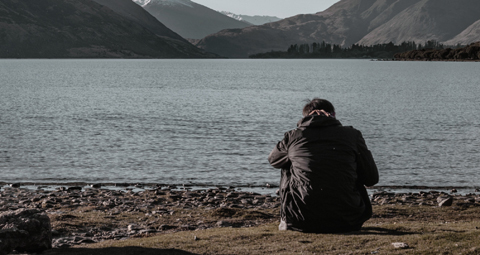October 12 | ![]() 0 COMMENTS
0 COMMENTS ![]() print
print

A hidden darkness in the Highlands: Fr James Bell on a mental and social health crisis
Fr Bell, the parish priest of St Mary’s Church in Inverness, discusses mental illness, hope and challenges surrounding the issue.
Inverness is the fastest growing city in Europe, and one of the most beautiful. The riverside, with its churches, restaurants, bars and bistros is enchanting to both tourists and locals. St Mary’s, Inverness is a lovely Church which attracts many visitors. Masses resonate with Catholic voices and pilgrims who come to see the stained glass windows of St Columba, St John Ogilvie and St Mary MacKillop. There is much to see and celebrate.
However, there is another dimension to the mission of the Church at St Mary’s, apart from sacramental ministries—making space available for groups such as Narcotics Anonymous, Gamblers Anonymous and other self-help fellowships. Drug addictions are part of the hidden darkness of the Highlands, quite apart from the endemic alcoholism that is part of every Scottish city. Children are easy targets so that there is hardly a secondary school where drugs are not available.
Recently the 21-year-old grandson of one parishioner, died by himself, the victim of his own drug misuse. There are many such stories: the young father, the victim of a drugs-related murder, many funerals of victims of alcohol and drug abuse, and more than a few suicides. This is the shadow side of a lovely city that is otherwise so vibrant.
Last September the SCO carried a report of the funeral of a young mother of three who killed herself, and my appeal as parish priest of St Mary’s that politicians and others should do more to tackle the scourge of suicide. The suicide rate in the Highlands is one of the highest in Scotland.
The publicity that arose from press coverage of this tragic funeral brought me into contact with clinicians, local politicians and others involved in suicide prevention. It became clear that the failures of the NHS to deal with the large number of suicides is more systemic than clinical. Doctors, nurses and psychiatric social workers are overstretched and poorly resourced. Until there is a strong political will it is likely that the NHS will be impeded in its therapeutic aims.
Hope
Fortunately in Inverness there has been the growth of a strong voluntary sector. Recently, the Inverness Common Good Fund gave funds to Mikeysline, and its associated Hive Drop-in Centre. Mikeysline began in 2015 as the initiative of Ron Williamson, the uncle of Mikey who killed himself after the death of his friend. Mr Williamson, speaking about his project said: “There is no quick fix—it took two years before young people in Inverness started trusting us.”
This programme is now rolling out into other Highland towns as a consequence of charitable donations.
To support young people at risk from suicide it is necessary to catch the attention of the public and to create a new consciousness. An enormous boost to this was the decision of the Inverness born actress, Karen Gillan, to make a film when she read that the suicide rate in the Highlands of Scotland was higher among young men than anywhere else in Scotland.
“Why [is this], when it’s such an idyllic place to live?” she asked. “It’s beautiful and we get tourists all the time, so the film was an exploration of that.”
The Party’s Just Beginning was released earlier this year, and it explores the grief of a young woman over the suicide of a friend who was gay and in relationship with a ‘closeted Christian.’ A film like this invites us to examine our attitudes not only to why people feel so isolated as to kill themselves, but also we are invited to ask ourselves if we are sufficiently caring to those who have same-sex attraction.
The reasons for suicide are multifarious, and trying to grapple with the problem will always need sensitive awareness of the burdens that people carry—many of them not self-imposed.
Modern challenge
The addictive nature of the electronic media, the isolation of so many young people trapped in a virtual world of fantasy, and the easy opportunities for destructive relationships are all very modern challenges.
This week, ‘Mental Health Week’ is an opportunity for all of us to examine our lifestyles, our emotions, our bodily and spiritual health. Catholics have a rich culture of self-awareness, of celebrating life and caring for others.
If we can live our Faith authentically and with integrity, perhaps there is just a hope that others will find us attractive, and want to share with us that deep communion with God that gives not only purpose but joy in living.
- James Bell is parish priest of St Mary’s, Inverness











